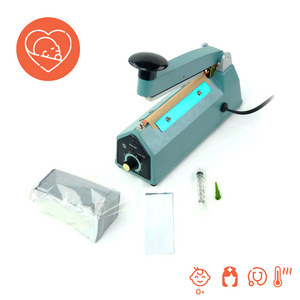
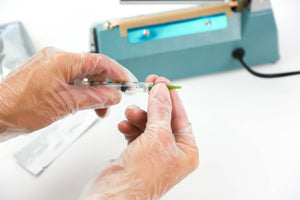
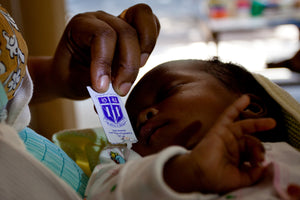
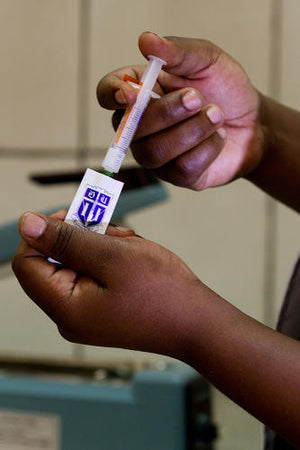
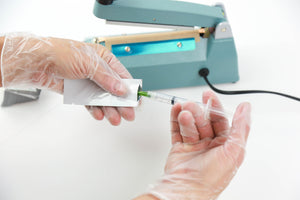
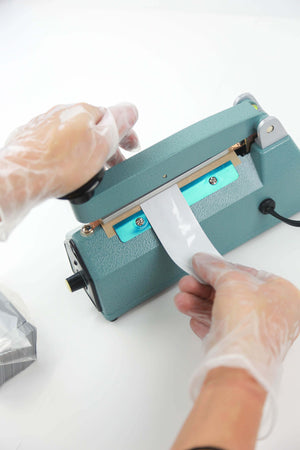

Pratt Pouch for ARV for HIV
-
The Pratt Pouch is a drug delivery device that allows pre-dosing of antiretrovirals for infants born to HIV positive mothers. The device has the following properties:
- Ultra low cost and more reliable dosing
- Heat-stable means of treating newborns
- More discreet than a large bottle and dropper for reducing stigma of HIV
THE PROBLEM
Every year tens of thousands of infants are infected with HIV during childbirth or breastfeeding. Antiretroviral prophylaxis Nevirapine (NVP), properly dosed and administered, can prevent this transmission of HIV, but the drugs must be given within 24 hours of birth (or at most 72 hours) and they must be given to HIV-exposed infants for six weeks. The current means of administering ARVs to an infant are often with a bottle and dropper, a method that has proven to be messy and unreliable. It is very difficult to get precisely the right dosage when using a dropper, bottle and active infant
THE SOLUTION
The Pratt Pouch allows reliable, pre-dosed administration of the life-saving drugs in the home, by the mother. This innovation has the potential to stop a large percentage of new HIV infections each year (without ARVs 15-45% of infants with HIV positive mothers will be infected with the virus).
This unique drug delivery method (a single dose sealed polyethylene pouch) allows home based provision of antiretrovirals for newborns in remote settings. Many women give birth at home (50 percent globally) and live too far from a clinic to travel back and forth. ARVs in a bottle are subject to measurement errors and spills. With the Pratt Pouch, a mother brings home a 14 day to six week supply of pre-dosed pouches. At home she tears open the pre-dosed package and drops the life-saving drugs into the infant's mouth. Studies of the Pratt Pouch in the field indicate that dosing accuracy improves from 50 percent to 90 percent with use of the Pratt Pouch, allowing enhanced prevention of mother to child transmission of HIV.
The unique four-layer pouch is a drug delivery device that preserves antiretroviral medicines at room temperature and allows PMTCT (prevention of mother to child transmission of HIV). This method is in use in Uganda and Ecuador. In Ecuador, through VIHDA, HIV has already been prevented in 1000 infants.
The Pratt Pouch is filled and sealed with a heat sealer so that the anti-retrovirals (ARVs) can be stored at home until needed after a home birth.
The Pratt Pouch was developed by Duke University's Engineering School and tested in clinical trials in Ecuador, Zambia and Tanzania. In Uganda, the Elizabeth Glaser Pediatric AIDS Foundation is scaling up the Pratt Pouch to reach 40,000 HIV positive mothers and to prevent the transmission of HIV from mother to child, with support from The Gates Foundation and Saving Lives at Birth. The unique packaging allows antiretrovirals to be packaged for a life span of 12 months.
Local pharmacies can be equipped to fill the pouches on location and then distribute the pouches to hospitals, clinics and rural communities. There are two models currently in use for pouch filling: 1) In Ecuador, pouches are filled by hand using a simple syringe, syringe tip and pouch sealing setup 2) In Uganda centralized and mechanized pouch filling machines are being set up in cooperation with the Ministry of Health. At home, a mother or caregiver tears open the Pratt pouch packet and squeeze the medication into a baby’s mouth – much like a packet of ketchup. User feedback indicates that mothers prefer this discreet method of providing ARVs, reducing the stigma associated with HIV status.
Where is the price?
Pricing is based on shipping location and the number of units ordered. To request a price, please use the Request a Quote button below. A sales representative will respond to you quickly.
The Pratt Pouch is a drug delivery device that allows pre-dosing of antiretrovirals for infants born to HIV positive mothers. The device has the following properties:
- Ultra low cost and more reliable dosing
- Heat-stable means of treating newborns
- More discreet than a large bottle and dropper for reducing stigma of HIV
THE PROBLEM
Every year tens of thousands of infants are infected with HIV during childbirth or breastfeeding. Antiretroviral prophylaxis Nevirapine (NVP), properly dosed and administered, can prevent this transmission of HIV, but the drugs must be given within 24 hours of birth (or at most 72 hours) and they must be given to HIV-exposed infants for six weeks. The current means of administering ARVs to an infant are often with a bottle and dropper, a method that has proven to be messy and unreliable. It is very difficult to get precisely the right dosage when using a dropper, bottle and active infant
THE SOLUTION
The Pratt Pouch allows reliable, pre-dosed administration of the life-saving drugs in the home, by the mother. This innovation has the potential to stop a large percentage of new HIV infections each year (without ARVs 15-45% of infants with HIV positive mothers will be infected with the virus).
This unique drug delivery method (a single dose sealed polyethylene pouch) allows home based provision of antiretrovirals for newborns in remote settings. Many women give birth at home (50 percent globally) and live too far from a clinic to travel back and forth. ARVs in a bottle are subject to measurement errors and spills. With the Pratt Pouch, a mother brings home a 14 day to six week supply of pre-dosed pouches. At home she tears open the pre-dosed package and drops the life-saving drugs into the infant's mouth. Studies of the Pratt Pouch in the field indicate that dosing accuracy improves from 50 percent to 90 percent with use of the Pratt Pouch, allowing enhanced prevention of mother to child transmission of HIV.
The unique four-layer pouch is a drug delivery device that preserves antiretroviral medicines at room temperature and allows PMTCT (prevention of mother to child transmission of HIV). This method is in use in Uganda and Ecuador. In Ecuador, through VIHDA, HIV has already been prevented in 1000 infants.
The Pratt Pouch is filled and sealed with a heat sealer so that the anti-retrovirals (ARVs) can be stored at home until needed after a home birth.
The Pratt Pouch was developed by Duke University's Engineering School and tested in clinical trials in Ecuador, Zambia and Tanzania. In Uganda, the Elizabeth Glaser Pediatric AIDS Foundation is scaling up the Pratt Pouch to reach 40,000 HIV positive mothers and to prevent the transmission of HIV from mother to child, with support from The Gates Foundation and Saving Lives at Birth. The unique packaging allows antiretrovirals to be packaged for a life span of 12 months.
Local pharmacies can be equipped to fill the pouches on location and then distribute the pouches to hospitals, clinics and rural communities. There are two models currently in use for pouch filling: 1) In Ecuador, pouches are filled by hand using a simple syringe, syringe tip and pouch sealing setup 2) In Uganda centralized and mechanized pouch filling machines are being set up in cooperation with the Ministry of Health. At home, a mother or caregiver tears open the Pratt pouch packet and squeeze the medication into a baby’s mouth – much like a packet of ketchup. User feedback indicates that mothers prefer this discreet method of providing ARVs, reducing the stigma associated with HIV status.









